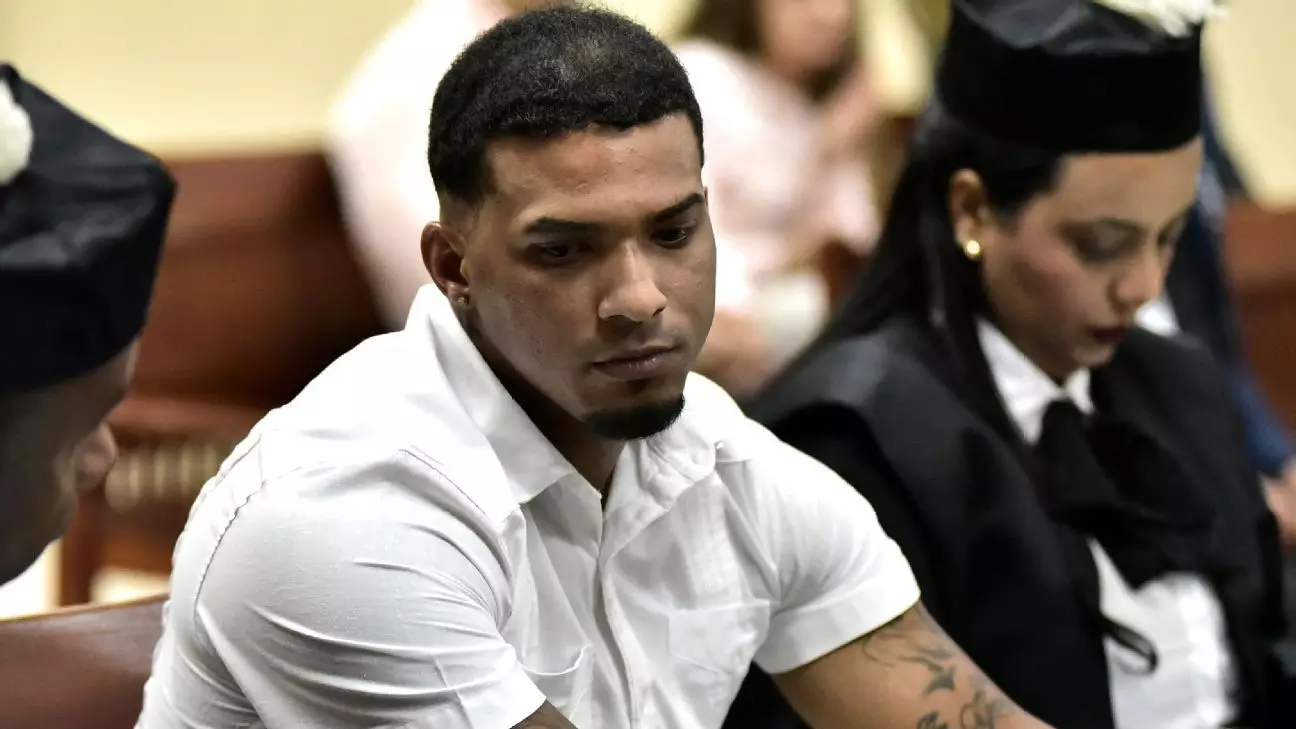The sports world loves a compelling narrative, especially when it involves an athlete on the brink of greatness. Wander Franco, once heralded as the future of Major League Baseball and a linchpin for the Tampa Bay Rays, has now become a cautionary tale of ambition gone awry. The recent conviction of Franco for sexual abuse of a minor casts a long shadow on what appeared to be a sensational career. Far from illuminating his path, it exposes the dark underbelly of fame that often remains hidden beneath glimmering accolades and records.
Franco’s criminal instance of engaging in a sexual relationship with a minor—at 21, he had sexual encounters with a 14-year-old girl—raises serious questions about personal responsibility and moral accountability. The leniency shown by the Dominican Republic’s judicial system, wherein he received merely a suspended sentence, begs the question of how deeply ingrained societal norms may be contributing to such an alarming attitude toward the abuse of minors. The sentence appears to reflect not only a failure of justice but also an unsettling normalization of predatory behavior that should provoke outrage.
The Pervasive Culture of Silence
What might be most distressing is the culture surrounding Franco that allowed these actions to flourish unchecked. The mother of the victim, convicted for trafficking her daughter, pulls back the curtain on a disturbing reality: a system that encourages exploitation for financial gain. It’s difficult to ignore the tragic interplay of vulnerability and predation that exists within the fabric of society, exacerbated by individuals who prioritize profit over the well-being of children. Franco’s relationship with the victim was marred not just by his actions but also by the environmental forces around her—forces that allowed such a relationship to exist without immediate repercussions.
A society that allows for silence in the face of such atrocities cultivates an incubatory atmosphere for abuse. Franco’s initial denial of the allegations, followed by MLB’s administrative leave, showcased a preferred image management approach rather than a proactive stance on confronting misconduct. The league’s reluctance to engage decisively raises questions about their commitment to safeguarding young fans and players alike. Are sports organizations equipped to deal with moral failures, or do they merely seek to preserve their brand at the expense of ethics?
The Price of Fame
Franco’s fall from grace is emblematic of a larger issue within professional sports: the adulation of talent often relegates moral failure to the background, allowing it to become a mere footnote in the biography of an athlete. While Franco was a beacon of hope for Tampa Bay, earning accolades and pulling in lucrative contracts, his convictions have now marred his legacy. The allure of a $182 million contract didn’t really consider the moral weight of personal conduct, and Major League Baseball’s open investigation only adds to the complexity of his situation.
The potential repercussions for Franco extend beyond the diamond, threatening his ability to secure a work visa in the U.S. His future in baseball now hangs in a precarious balance. Will he be able to escape the repercussions of his past actions, or will they forever dictate the course of his sporting career? The restrictions around his contract mean he’d be financially insulated, yet he could find himself forever tainted by the shadows of his decisions.
Impacts Beyond the Player
The ramifications of Franco’s actions extend beyond his own personal failings; they reverberate through the lives impacted by his decisions. While the legal system has provided a certain outcome, the broader societal implications are far more complex. This case magnifies systemic failures in protecting the most vulnerable in our communities, particularly when those individuals are entwined with the powerful machinery of organized sports.
The conviction also serves as a wake-up call, urging communities and institutions to implement preventative measures against abuse. Protecting minors and fostering environments conducive to open discussions about misconduct must move to the forefront of societal values. The tragic reality is that children are often at the mercy of precarious circumstances, and anything less than vigilance in safeguarding their welfare isn’t merely complacent; it is complicity.
In the wake of Franco’s fall, it’s impossible not to grapple with the dichotomy of adulation and condemnation. As the sports world moves to address this egregious breach of trust, it must also reflect on its role in fostering a culture that prioritizes accountability over silence.


Leave a Reply